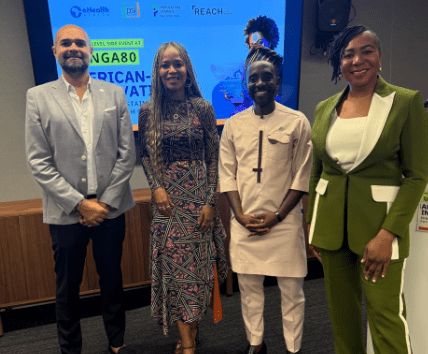As world leaders gather at the United Nations General Assembly (UNGA) in New York, United States, the Executive Director of eHealth Africa, Atef Fawaz, has called on African leaders to focus on innovation, especially in health technology.
In his opening remarks as lead organiser of one of the breakout sessions on the topic, ‘African-led Innovation: Shaping Sustainable Futures with or Without Aid’, Fawaz said there are improvements in funding and commitment, but there is still room for increase.
Fawaz said: “Some African governments are beginning to prioritise innovation, especially in health technology. We are seeing increased funding and commitment, which is both encouraging and proof that this works.
“We believe that Africa will be among the top 10–20 emerging markets in the next two decades. This is the place to be. My message to the younger generation is: look into Africa, invest in Africa—whether in health projects or tech. There is so much potential and talent here, and that’s what we are pushing forward.
“The world is evolving very quickly, and this year in particular has accelerated discussions about how we remodel development on the continent. When we say with or without aid, we are not rejecting partnerships.
“We are saying that partnerships must be aligned with Africa’s priorities. It’s not about others bringing ready-made solutions to us, but about us co-designing sustainable solutions together.
“This is pivotal because Africa has ideas, insights, local knowledge, population, and real challenges. What we need is complementarity—global partners meeting us halfway, combining resources and expertise to develop long-term, sustainable initiatives.
“It’s about moving beyond short pilot projects to multi-year initiatives that genuinely serve people across Africa. And there’s no better place to have these discussions than here, where global decision-makers are present.
“That was very powerful. When you have a message, you take it to the highest stage—and that’s exactly what eHealth Africa has done at UNGA, spotlighting resilience, sovereignty, and creativity across sectors for sustainability.”
On her part, the Director of Partnerships and Programmes at eHealth Africa, Ota Akhigbe, said Africa is no longer just being invited to the table—Africa is leading conversations.
“When it comes to women’s leadership, we look at examples like Mrs Amina Mohammed, Sandra Ojiambo, and many others who are shaping important decisions and showing that Africa is co-creating solutions, not just participating.
“Another key point is visibility. At Unstoppable Africa, it was powerful to witness so many Africans present, making statements, and driving discussions. The time for Africa is here—there is visibility, and with visibility comes influence.
“With eHealth Africa, we are not only creating solutions at home but also bringing them here to influence global a conversation, which is why convening diverse actors at our side event today was so important.
“For me, the mood is exciting—it’s an opportunity to not just join conversations but to lead them and shape how they move forward.”
The Founder of Healthcare Africa, Dr Ola Brown, who is a panellist in the session, highlighted the interplay between government and private capital in innovation.
Brown said, “When you look at the U.S., the Internet was born from a DARPA project, and 75% of new drugs trace back to government-funded research. But private capital scaled those innovations. In Africa, governments face capital constraints, so the model may look different.
“When we invest in healthcare innovation in Africa, we don’t just create a healthier continent—we create a healthier world,” she noted, citing examples like RapidDeploy, now serving 20 U.S. states, and InstaDeep, acquired for $1 billion to accelerate global drug discovery.”
Another panellist and the President and Chief Executive Officer of PSI, Michael Holscher, reminded the audience that true innovation is judged not by its novelty, but by its sustainability. He said: “One of the most critical players is the community itself—that woman in the marketplace, or that man in the village.
“Our projects have timelines. But beyond short-term results, the question always is: what happens when we leave? True sustainability rests in the ownership of stakeholders.”















